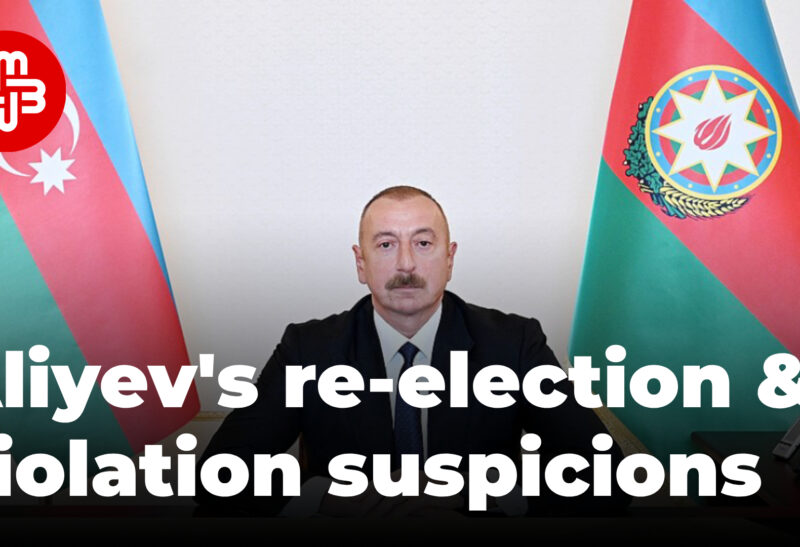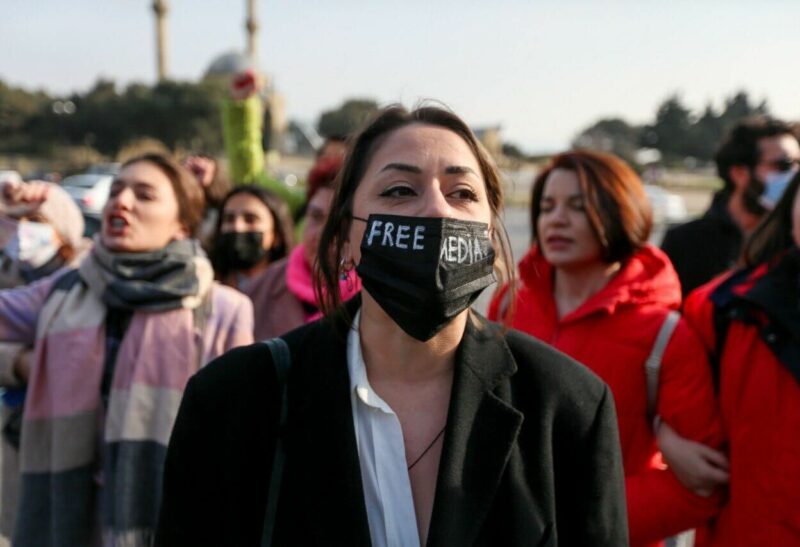
After the recent snap presidential election, some European politicians issued surprisingly positive assessments of Azerbaijan’s democratic processes. Coming in the wake of last year’s revelations about Azerbaijan’s
massive campaign
to illicitly buy influence in Europe, the West’s relationship with the Azerbaijani regime has become a hotly debated topic. Meydan TV spoke with historian Altay Goyushov to discuss the West’s relationship with Azerbaijan and how it has developed in recent years.
– Altay bey, in your statements on social media about the political situation in Azerbaijan you tend to accuse the West. Why is it the West, and not Russia or Iran, that you blame for the suffocation of democracy?
– I accuse the West because it’s all about democracy, the rule of law and human rights. In this respect what kind of attention can I expect from Russia or Iran? One tends to be hurt when one has expectations, and because we consider ourselves to be pro-Western we talk about Europe. Only the West can help establish in Azerbaijan values like democracy, human rights and the rule of law. At the same time, the West can influence the Azerbaijani government to this end because the government’s ties with the West are very profound and they listen to each other. Therefore, the West has every opportunity to influence the Azerbaijani government. Secondly, those values are not Russian or Iranian values. Present-day Russia and Iran are before your eyes to see. The kind of system that we want to establish in Azerbaijan comes from Western values. We want values that move society towards progress to take shape and establish themselves in Azerbaijan.
– But the EU or the United States will not build a democratic society for Azerbaijanis. Doesn’t the nation itself have to want it and fight for it?
– I’m not talking about the West building a democratic society instead of the Azerbaijani people. This is about whether it supports the democratic process or the entrenched authoritarian regime. If you put these on a scale, the West prefers to support the authoritarian government to protect its own interests, rather than to provide meaningful support to the democratic movement. I’m not saying that the West should give up on its interests, but it should consider the fact that sacrificing values will also heavily damage its interests later on.
– Don’t you think that the OSCE observation mission’s
assessments
of the presidential elections held in 2003 and 2013 and of the early presidential election held on 11 April were harsh?
– Yes, they were harsh, but in this particular situation they don’t have any impact. A statement by the West in 2003 could have supported democratization in Azerbaijan and steered the process in the right direction. Or, regarding the presidential election of 1998 or the parliamentary election of 2000, in those years, the West’s influence and impact in Azerbaijan were very strong. Because the parliamentary election in 2000 was held under the proportional system, the Musavat party was over the threshold, but we know what happened. They should have done something then. But back then they didn’t use any of this influence. Even the Council of Europe’s assessment of every rigged election in Azerbaijan was that “it’s a step toward democracy.” But every election was worse than the last, and we all know it. The situation has resulted in people saying now: “There’s the worst entrenched, consolidated authoritarian regime in Azerbaijan.” Therefore, regardless of how an election is assessed, that assessment doesn’t have the power to impact elections because the regime is firmly established and strong. You know, they needed to say that an election had been carried out improperly or that 58% of votes have not been counted correctly when the time was ripe, not that it was “a step toward democracy”. Now we must think, statements and words don’t work, what else can be done?!
– But there is one point that has to do with the consolidation of the opposition and society. Some experts cite as an example the fact that the opposition camp did not run in the 2000 parliament election or the 2003 presidential election as a unified force and that the London meeting ended with no result [
In 2003, Azerbaijani opposition leaders met in London to choose a unified candidate but could not come to an agreement – Meydan TV]
, and say, “What else can the West do?” Don’t you think that this approach had a negative impact on these processes?
– I don’t agree because that’s absurd. In the 2003 election, the Musavat party set up a strong opposition bloc and the organization’s ability to make an impact was no secret to anyone, there was no alternative to it. I’m not saying that the opposition didn’t make mistakes. But the opposition isn’t the issue: all of the opposition ran a unified campaign in the 2005 parliamentary election as the Freedom bloc, and what happened?! Right now everyone’s talking about people taking to the streets to
protest against Sargsyan
in Armenia. But in Azerbaijan people took to the squares after the 1998, 2000, 2003 and 2005 elections and the protests were stronger and better organized than those in Armenia. Even the protests during the 2003 election campaign were better organized than the protests one year later during the Rose Revolution in Georgia, and the turnout was much higher. Let’s put the previous years aside. After 2010, so many young people took to the streets to demand democratization that there was massive repression. But the kind of repression that took place in Azerbaijan didn’t materialize in Georgia or Armenia. But there wasn’t an adequate reaction from the West.
– Could it be that geopolitical, security or oil factors had a role to play in the West’s failure to give an adequate reaction?
– It’s not only oil, security or geopolitical factors, but bribes, too. The Azerbaijani government had plenty of resources and using them it managed to buy and put in its “pocket” Western politicians, diplomats, media and even researchers. But I am absolutely sure that the West has a greater ability to exert influence in its relationship with the Azerbaijan government than Baku does. Doesn’t the Azerbaijani government, which depends on the West, know that if it spoils relations these relations, it will end up in the claws of Russia and Iran?! They know it well. You know, I’m sorry for putting it so bluntly – the West has demonstrated a very stupid approach to the developments in Azerbaijan, and its research institutions have failed to assess the situation. Effectively, those institutions deceived Western policymakers, presenting the situation in Azerbaijan in a very distorted way. Some of them deceived for money like [CACI chairman]
S. Frederick Starr
, [Georgtown professor]
Brenda Shaffer
, and [CACI director]
Svante Cornell
, for example, while others deceived out of ignorance. The current situation arose because of false assessments. The result is that the secular opposition in Azerbaijan completely broke down, but discontent remained, and this discontent took the form of religion. As this situation developed, the West’s influence in Azerbaijan was shaken as well. In Azerbaijan, is the attitude to the West in 2018 the same as it was in 2000? Certainly not, and this is now the position of Azerbaijani society, and they know it themselves and write about it. If it goes on like this, the West’s influence in Azerbaijan will completely break down. We may be approaching these events emotionally, but it is Azerbaijan society that is repressed and tortured and suffering. They [
the West – Meydan TV
] are not suffering at all and have achieved what they wanted.
– In any case, recently the Council of Europe, which we have criticized very strongly, has published its
“Caviar Diplomacy” report
, while the International Consortium of Investigative Journalists has published its
“Laundromat”
investigation…
– What has the result been? Have those involved in corruption been punished? Or have you seen the assessments given to the 11 April election by Italian MP Antonio Razzi and an Australian MP? Razzi says he wishes the election in Italy were held at such a high caliber. The other MP says that even Australia should learn from the democracy in Azerbaijan. Would they issue those kinds of assessments if they were not confident? But they don’t say that for free. Have [former PACE member Luca]
Volonte
, [former PACE president Pedro]
Agramunt
, [former PACE member Debono]
Grech
and [former US Ambassador to Azerbaijan Stanley]
Escudero
been forgotten?! So many issues have been revealed, and who has been punished to serve as a lesson to others? Nobody has been punished. They openly turn a blind eye to it. Yes, Western media write about it. Those same media wrote in 2003, too. In 2004, The Washington Post published an article titled “Our Man in Baku” about the election in 2003. The only result was that the Clinton and Bush administrations ended up connected to the Aliyevs. Even Barack Obama invited Ilham Aliyev to meet with him, and we know about Trump. In these past few years, have those articles helped democratization in the country in the context of Azerbaijan-US relations or, on the contrary, has the situation become worse?
– In this case, let’s put the question directly – is the West’s interest in Azerbaijan financial or is it security-related?
– Undoubtedly, it has security and geopolitical interests. However, alongside them there are also other things, like the bribes that were paid when the government launched its lobbying activities. In addition to those who took bribes, there are also who provided inadequate assessments to policymakers due to their ignorance of the situation in the country. The problem is systemic.



